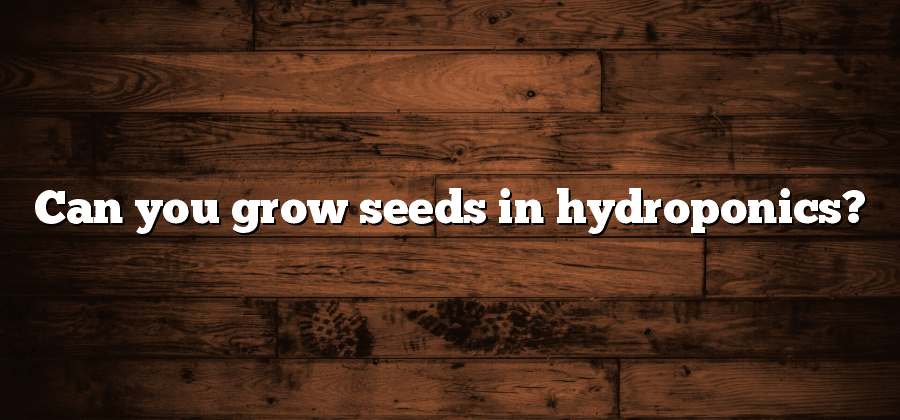Choosing the Right Seeds
When it comes to hydroponic gardening, selecting the right seeds is a crucial first step towards a successful harvest. The choice of seeds can greatly influence the quality, yield, and overall performance of your hydroponic system. Therefore, it is important to consider several factors before making your final decision.
First and foremost, you need to determine the type of plants you want to grow. Are you interested in cultivating leafy greens, herbs, flowering plants, or even fruiting vegetables? Each type of plant has unique requirements and preferences, such as light intensity, nutrient levels, and temperature range. Understanding the specific needs of your chosen plants will guide you in selecting seeds that are suitable for hydroponic growth. Additionally, consider whether you prefer open-pollinated, heirloom, or hybrid seeds, as each has its own advantages and characteristics. These factors will help you narrow down your options and ensure that you choose seeds that are compatible with your desired hydroponic setup.
Next, it is essential to purchase seeds from reliable suppliers. Opt for reputable seed companies that provide high-quality, disease-free seeds. You may also want to explore specialized hydroponic seed suppliers, as they often offer a wider selection of varieties specifically adapted for hydroponic growing conditions. It’s worth investing a little extra money in premium seeds to maximize your chances of a bountiful and healthy crop. Remember, the success of your hydroponic garden starts with the right seeds, so prioritize quality and reliability in your selection process.
Seed Germination in Hydroponics
Hydroponics is a modern method of growing plants without soil, where the plants are instead anchored in a growing medium such as perlite or coconut coir. Seed germination is the first crucial step in hydroponic gardening, as it lays the foundation for healthy plant growth.
Proper seed germination in hydroponics requires a few key factors. Firstly, maintaining the right temperature is essential. Most seeds germinate best in temperatures between 70-85°F (21-29°C), so it is important to provide a controlled environment within this temperature range. Secondly, providing adequate moisture is vital for successful germination. The growing medium should be kept consistently moist but not soaked, as excessive moisture can lead to rotting of the seeds. Lastly, it is important to ensure that the seeds receive sufficient light. While some seeds require darkness to germinate, most benefit from exposure to light, which can be achieved through the use of fluorescent bulbs or specialized grow lights.
Creating the Ideal Environment
Creating the ideal environment for seed germination in hydroponics is crucial to ensure the healthy growth and development of your plants. Firstly, it is essential to maintain the right temperature, as different plant species have specific temperature requirements for optimal seed germination. Monitoring and adjusting the temperature within the growing area can be achieved through the use of heaters, fans, or climate control systems.
Alongside temperature, the humidity level should also be carefully regulated. High humidity can lead to excessive moisture, increasing the risk of fungal issues and hindering seed germination. On the other hand, low humidity can cause the seeds to dry out and fail to germinate. By utilizing humidifiers or dehumidifiers, you can create an environment with the appropriate humidity level to support successful seed germination.
In addition to temperature and humidity, proper lighting is vital for seed germination in hydroponics. Seeds require adequate light to trigger the germination process, as it stimulates photosynthesis and helps in the development of chlorophyll. LED grow lights are commonly used for hydroponic systems, as they emit the right wavelengths required for optimal plant growth. By positioning the lights at the correct distance and ensuring sufficient light intensity, you can provide the ideal lighting conditions for seed germination.
Remember, creating and maintaining the ideal environment for seed germination in hydroponics requires constant monitoring and adjustment of temperature, humidity, and lighting. By carefully managing these factors, you can provide the best conditions for your seeds to sprout and thrive in your hydroponic system.
Providing the Right Nutrients
One essential aspect of successful hydroponic gardening is providing the right nutrients to your plants. Unlike traditional soil-based gardening, where plants obtain nutrients from the soil, hydroponic plants rely solely on the nutrient solution provided by the grower. The nutrient solution serves as a substitute for soil, containing all the necessary elements that plants need to grow and thrive.
To ensure that your plants receive the proper nutrients, it is crucial to use a high-quality hydroponic solution. These solutions are specially formulated to meet the specific needs of hydroponic plants, providing a balanced blend of essential macro and micronutrients. It is important to follow the recommended dosage instructions, as overfeeding or underfeeding can have detrimental effects on plant health. Regularly monitoring the pH levels of your nutrient solution is also essential, as the optimal pH range for hydroponic plants is slightly different from that of soil-based plants. By providing the right nutrients in the correct amounts and pH levels, you can help your hydroponic plants reach their full potential.
Ensuring Sufficient Water Supply
Water is a critical element in hydroponic systems, and ensuring a sufficient supply of water is vital for the success of your plants. Without adequate water, the plants may suffer from nutrient deficiencies, dehydration, and even die. Therefore, it is essential to establish a robust water management system to meet the specific needs of your hydroponic setup.
One way to ensure a sufficient water supply is by utilizing a high-quality water reservoir. This reservoir should be large enough to hold an ample amount of water to sustain the plants throughout their growth cycle. Additionally, it should be made of food-grade materials to prevent any contamination that could harm the plants. Regular monitoring of the water level is necessary to avoid situations of water scarcity. By keeping the reservoir topped up and replenishing the water as needed, you can provide your plants with a consistent and adequate water supply, promoting their healthy growth.






